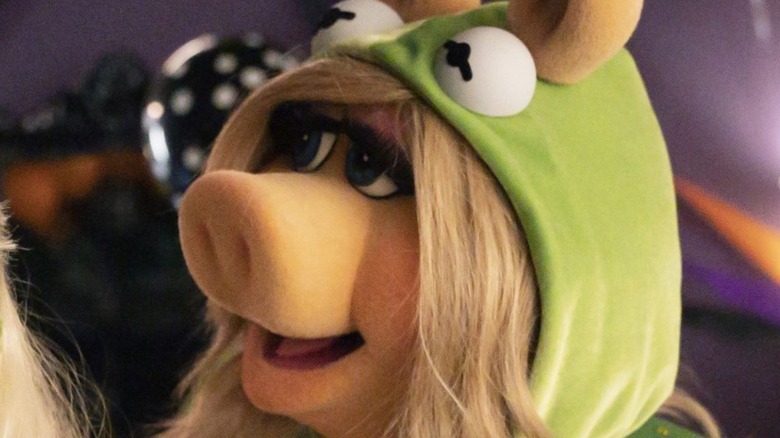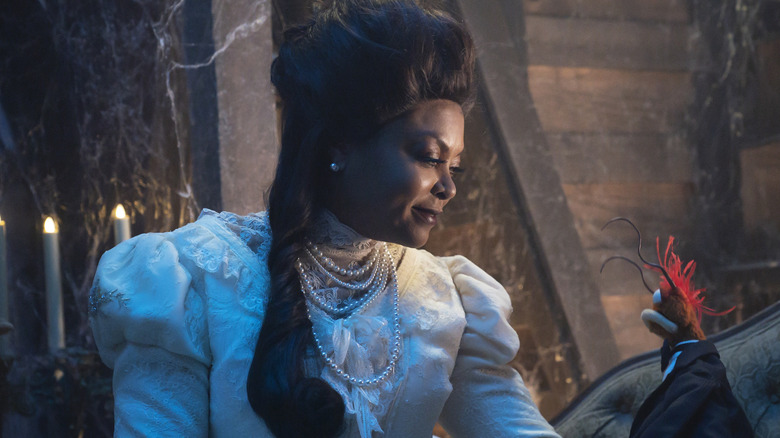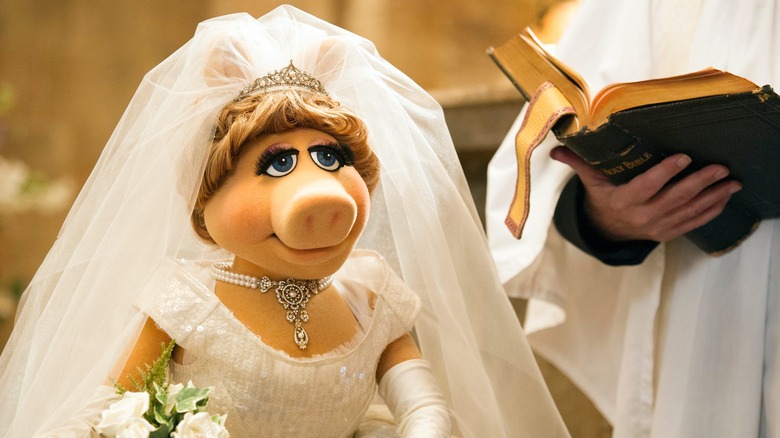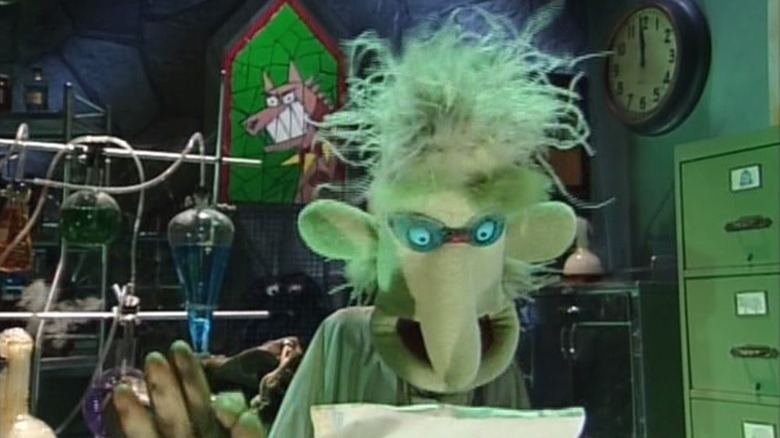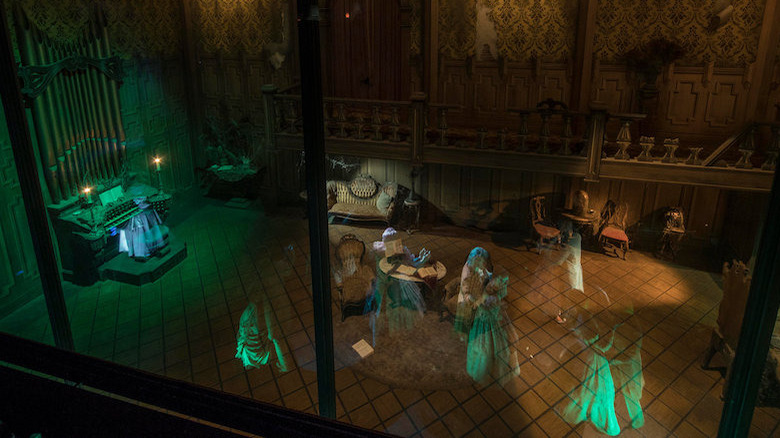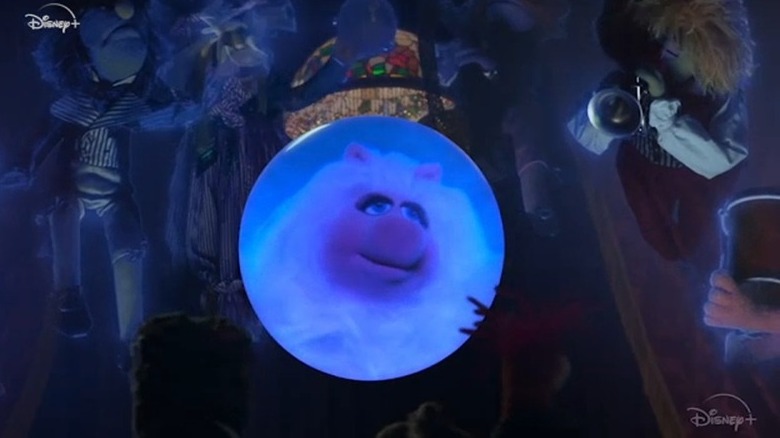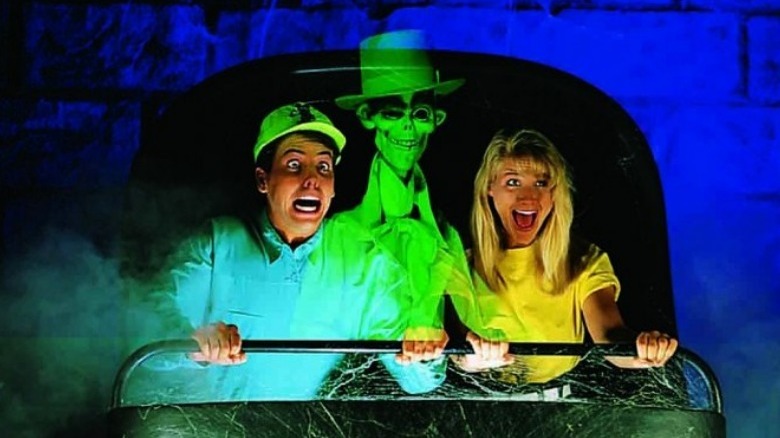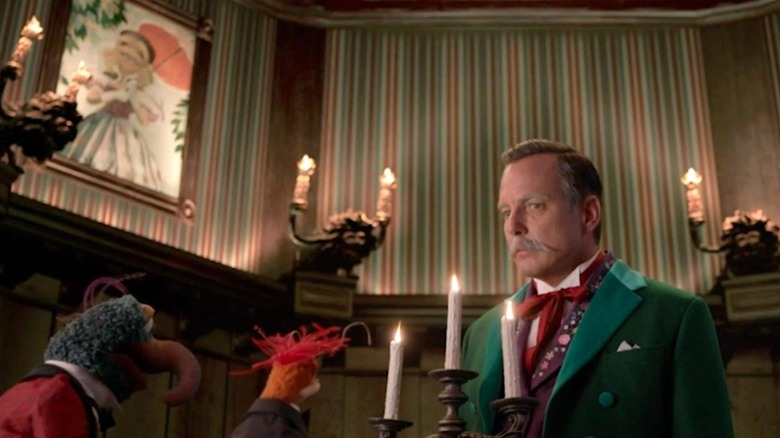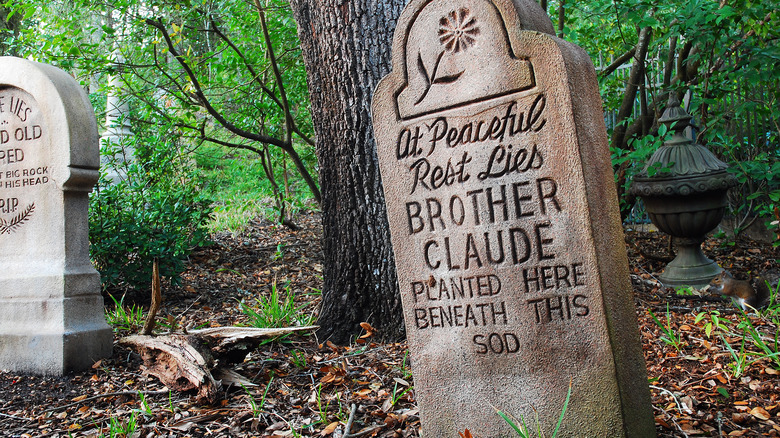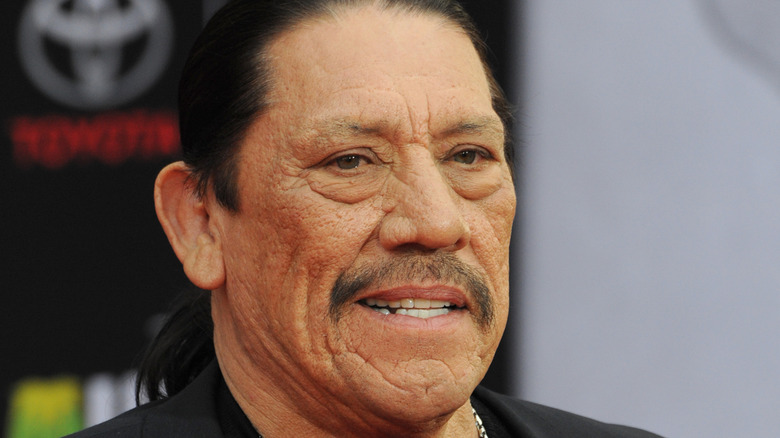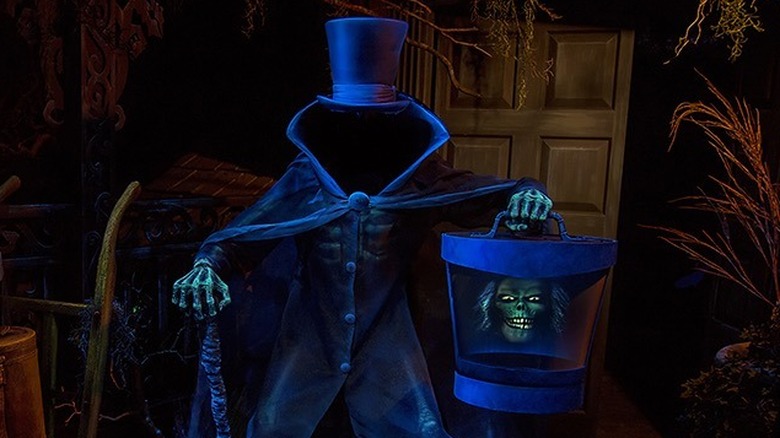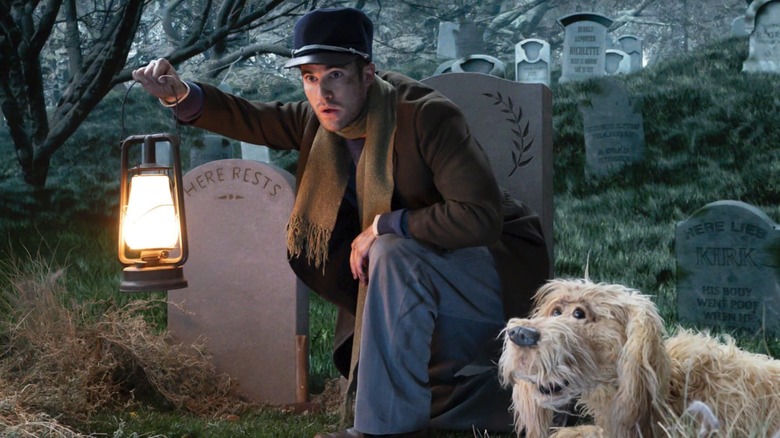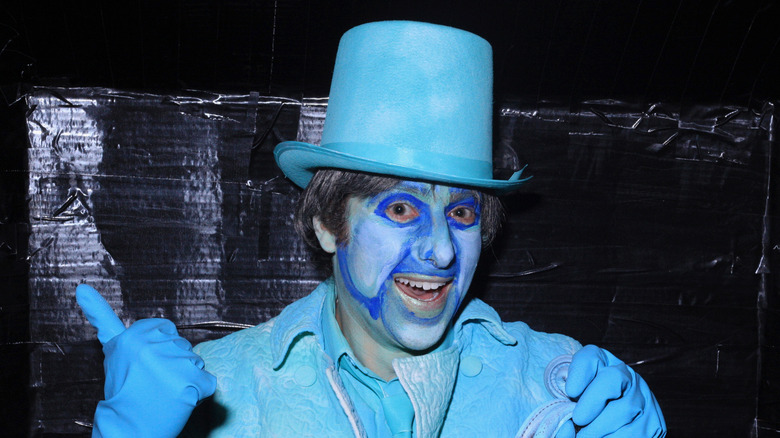Easter Eggs And References In Muppets Haunted Mansion You May Have Missed
Creepy and goofy are not mutually exclusive experiences. The mood of Disney's iconic Haunted Mansion ride is the result of a disagreement between two Imagineers, Marc Davis and Claude Coats, in the '60s. Coats wanted to make something genuinely scary. Davis wanted the attraction to be more fun. In the end, the Haunted Mansion is both; the mansion is brimming with silly gags, but still runs chills up guests' spines using a flurry of technological and illusory wonders.
In 1969, three years after Walt Disney's death, the long-incubating Haunted Mansion project reached completion at the California-based Disneyland, then sprouted its own iterations at the Florida-based Magic Kingdom and Tokyo Disneyland. Over five decades later, a Muppet duo, Gonzo the Great and Pepe the King Prawn, entered the Haunted Mansion for the Halloween special "Muppets Haunted Mansion." There's no better mashup — after all, Jim Henson's Muppets and the Haunted Mansion are both antiquities of the '60s and '70s (although they've both received some updates since then).
"Muppets Haunted Mansion" is full of references that should excite old school and modern Muppet fans and lovers of the ride. Even if you haven't been to a Disney park, if you watched the Eddie Murphy-starring "The Haunted Mansion," you may be able to catch some of the Easter eggs hiding in "Muppets Haunted Mansion." Either way, watching Gonzo and Pepe confront spirits and scares based on the ride is a ton of fun — and don't worry about missing anything. We'll exhume six feet under, and unearth the background references and Easter eggs that pay tribute to both the ride and Muppet history.
Constance Hatchaway the Attic Bride
Pepe the King Prawn nearly got married to the seductive Constance Hatchaway, inhabited by a hammy Taraji P. Henson, as the spirits of her husbands-victims shake their heads at history repeating itself. She's introduced in black (she's not called the Black Widow Bride for nothing) at the top of the stairs in reference to an Imagineer's concept sketch for the first Bride animatronic. She owns an ax inscribed with "Till Death Do Us Part," echoing a catchphrase of her most recent animatronic incarnation who clutches a hatchet like a bouquet. This Constance is a composite of the early Attic Bride animatronic and the current Constance Hatchaway figure who replaced her.
A blaze of red glows in her heart, an attribute of the Attic Bride, herself a veiled enigma. Legends tell the Attic Bride was murdered in a fit of jealousy or she lost her mind and committed suicide. The Bride of the Haunted Mansion morphed from a paragon of imagined innocence into a sinister picture of bloodthirstiness when Constance Hatchaway, dressed in the same marital white, stepped in as the 2006 evolution of the Attic Bride. Constance's space is laden with photos of her beheaded beaus, and her line "in sickness... and in wealth" insinuates she was motivated by money. Speculations wondered if the Hatbox Ghost was one of Constance's beheaded husbands or an accomplice.
To Pepe and Gonzo, she also recites the ride's exit lines used by Madame Leota: "Hurry back."
Kermit Almost Got Married
When Pepe the King Prawn recounts his terrifying near-marriage to the homicidal Constance, Kermit remarks, "Been there, done that." It's not just a throwaway line, but a callback to all the times that he nearly did get married to his on-again, off-again girlfriend, Miss Piggy. Miss Piggy's plans to get hitched to Kermit know no bounds. She dreamt it up in 1979's "The Muppet Movie," they played a married couple — the Cratchits — in "Muppet Christmas Carol," and she lamented her lost marital dreams in 2011's "The Muppets."
In the Season 3 episode of "The Muppet Show" hosted by Marisa Berenson, Miss Piggy comes up with a closing "comedy" sketch in which she and Kermit play a bride and groom, but secretly casts a real minister for the bit. However, before Kermit utters the scripted lines "I do," he wiggles out of the marriage by introducing the next act. Then comes 1984's "The Muppets Take Manhattan," in which Miss Piggy and Kermit stage a wedding. Despite having cold feet, the amphibian does sing "I do." If only he realized that the ceremony was presided over by a real priest!
A near-marriage also sort of happens in "Muppets Most Wanted," when the false Kermit, actually a criminal Russian frog named Constantine, proposes to Miss Piggy and they nearly exchange vows. Luckily, Miss Piggy comes to her senses and deduces that the real Kermit would be too nervous to answer the traditional matrimonial question (hey, did you notice that the names Constance and Constantine share the same etymological origins?).
Dr. Phil van Neuter
A lanky lab-coated Muppet originally puppeteered by Brian Henson (Jim Henson's son), Dr. Phil van Neuter is like Dr. Bunsen mixed with a PG-rated Rick Sanchez of "Rick and Morty" fame. Resurrecting Dr. van Neuter as a background Muppet who can be found among chorus singing "Life Hereafter" is appropriate, because the character has roots in the creepy, dating back to his debut on the post-Henson series "Muppets Tonight." Alongside his gorilla-like assistant Mulch (who also pops up in the background in the special), Dr. van Neuter hosted the recurring "Tales from the Vet" sketch, which was inspired by "Tales from the Crypt." He's the "friendly veterinarian" who works in a cobwebbed office full of caged creatures, and who once resurrected Arsenio Hall's corpse, Frankenstein-style (it's a long story).
Bill Barretta (Pepe) reported that Disney scrapped a scene in "Muppets Haunted Mansion" in which Dr. van Neuter had a bigger role, unscrewing Gonzo's head to examine his brain (thus, in the final product, Gonzo's note that he wouldn't mind entities peeking at his brain doesn't have a payoff). However, the scene was cut to accommodate the brief runtime of a holiday special. If the scene had been produced, it would have reunited van Neuter with Mulch, and thus extended Bunsen and Beaker's cameos. In fact, when Bunsen sighs, "Budget," he's referencing the scrapped scene.
As long-time fans know, Dr. van Neuter nearly conducted brain surgery on Gonzo in the 1999 movie "Muppets from Space," during which the maniacal neurosurgeon straps Gonzo underneath a death-ray-like surgical device. Hopefully you'll get your shot at Gonzo's brain one day, Phil.
The Ballroom Bits from The Muppet Show
"Muppets Haunted Mansion" wastes no time resurrecting the glory days of the Muppets. During the ballroom musical number, the camera pulls back to reveal the extension of the room's arches, much like the opening of "The Muppet Show."
A moving shot also glances into a ballroom of dancing Muppet ghosts as they exchange jokes — and sick burns — with their partners. In addition to paying homage to the real Haunted Mansion's ballroom of waltzing animatronic ghosts, the scene also recalls the vaudevillian days of "The Muppet Show." The show had a recurring bit with the same schtick: A Muppet — often a nondescript character outside of the main cast — would dance with another Muppet while trading funny, often pun-filled, conversations, cuing the laugh track.
The dancing Muppets are obviously chroma-keyed into the special, but in the actual ride, how do the waltzing ghosts achieve their lustrous transparency? To the rider's eye, it's easy to assume that they're holograms. But look no further than the "Pepper's Ghost" illusion for the phantasmagoric effect. You're not looking at the animatronics waltzing on turntables, but rather their reflections, angled through mirrors concealed from the guests' eyes. Lighting tricks make them vanish and rematerialize.
Madame Leota's Daughter Kim Irvine
The most iconic moment in the Haunted Mansion ride is the seance chamber, where Madame Leota communes with the spirits through her floating crystal ball. In "Muppets Haunted Mansion," Miss Piggy takes over Leota's role, playing "Pigota."
Meanwhile, the woman who Pigota orders to polish her crystal ball is played by Kim Irvine, who is part of a proud Disney lineage. Not only is she an Imagineer, but she's the daughter of "Pinnocchio" animator Harvey Toombs and the OG head of Madame Leota, Leota Toombs. As revealed in the second episode of "The Imagineering Story," Toombs was cast for her "high, exotic cheekbones," and was filmed in front of a camera in a dark room. Her face was projected onto the ball, in what is credited as an early example of projection mapping technology (Madame Leota's dialogue was provided by Eleanor Audley, the voice of Maleficent and Cindrella's wicked stepmother).
Toombs' contributions to the wheels, gears, and magic that make Disneyland run are not to be slept on. She created models for It's a Small World and Great Moments with Mr. Lincoln. Nearly two decades after her death in 1991, she was honored with the Disney Legend title.
Toombs' daughter was very much her apprentice. In addition to playing Leota in the seasonal "Nightmare Before Christmas" renovations that overtake the Haunted Mansion every year, Irvine also worked on Star Wars: Galaxy's Edge. In "The Imagineering Story," Irvine recounts how she would take her daughters on the ride to say "hello to grandmother" whenever they passed Madame Leota. Kim also hears her mother's voice when the recording of "Hurry back, hurry back" plays to exiting guests.
Statler and Waldorf and the Doom Buggies
In "Muppets Haunted Mansion," the two heckling elders, Statler and Waldorf, are back in ghost form, carrying out their tradition of booing and throwing shade at Fozzie and the Muppets. The geezers have their own moving booth as well — a Doom Buggy from the Haunted Mansion ride. The buggy even stops as voice over the intercom voice acts like the ride broke down, a feature of the actual attraction.
Doom Buggies were not in the earliest blueprints for the Haunted Mansion, which was planned as a walkthrough experience when Disney was alive. But Imagineers worried that crowds wouldn't move through the attraction fast enough, and ultimately repurposed the Omnimover system created for the Adventure Thru Inner Space ride, which still propels many rides in Disneyland and Disney World to this day.
The Stretching Room
Pepe and Gonzo are first brought into an ornate octagonal chamber with portraits of their Muppet pals' likenesses hanging on the wall, and are impressed by the room, its wallpapers and portraits, and its stretching. The Stretching Room indeed is one of the first sights that guests see inside the Haunted Mansion, as they watch the walls elongate along with seemingly innocuous paintings, which soon reveal the unfortunate fates of their subjects. This is the first chamber on the ride before the audience is spirited away onto the Doom Buggies.
How do the stretching room and its optical illusions work? If you're guessing that it's partly driven by an elevator, then you're correct — at least in the case of the Disneyland version of the Mansion. Because the elevator is gravity-assisted, it can carry 90 living souls during its descent, but only 12 when it ascends. By contrast, the Magic Kingdom's Stretching Room is not an elevator and goes for an opposite effect: It stretches upward.
999 Happy Haunts and more
After arriving at the Haunted Mansion, Gonzo and Pepe are directed to Room 999, which can conveniently be flipped upside down to become the much more ominous 666.
999 is the number of "Happy Haunts" who reside in the Haunted Mansion — ie, the ghosts at the graveyard, the ballroom attendees, Pepe's would-be bride Constance, and more. The special's first musical number, "Rest in Peace," divulges each resting spirits' fate, straight from the epitaphs of the Haunted Mansion attraction. At the Disney parks, each grave is inscribed with the name of an Imagineers who worked on the Mansion. In the special, one tomb is inhabited by the spirit of Brother Claude, "planted here beneath this sod," played by legendary comedian Ed Asner in one of his last roles.
Claude is named after the Imagineer responsible for the ride's mood: Claude Coats, who is credited with pioneering the use of ultraviolet light in live special effects and three-dimensional environments. As for others, "Good Old Fred [Joerger]" created models of Disneyland's original attractions, while "Haunting Harriet [Burns]" designed some of the Mansion's 999 residents and was the runner up to play Madame Leota.
Danny Trejo as Cousin Huet
"Cousin Huet, we all know you didn't do it." Yes, Danny Trejo is Huet, the spirit behind the bars of a mausoleum, during the "Rest in Peace" number. We hope he really didn't "do" whatever felony the epitaph and song lyrics are alluding to. But Huet is an Imagineer name of honor — Imagineer Cliff Huet was a lead interior designer for the Mansion and an OG architect for Walt Disney Imagineering.
It's a running gag in modern Muppet projects that "Machete" star Danny Trejo is behind bars. Trejo first appeared in a deleted scene in 2011's "The Muppets" as an inmate who claims, "I'm a Muppet" when the Muppets are bailed out. In "Muppets Most Wanted," he's one of the growling (and singing, and dancing) brutes in the Russian gulag.
In "Muppets Haunted Mansion," Huet calls out, "Bring me some tacos," a homage to the time Trejo competed against the Swedish Chef in a taco-making showdown on "Muppets Now." Trejo also played an unlucky patient in a Muppets-themed Super Bowl commercial.
The Hatbox Ghost
Slotting Fozzie, who's notorious for crummy comedy routines, into the role of the Hatbox Ghost is fitting, because the Hatbox Ghost animatronic was a failure. Sorry.
To explain, the animatronic's schtick was to use magic to put his skull head into the box in his hand, leaving his headless torso behind. It was a good, if ghastly, idea that faltered in execution. How did the plan go haywire? Imagineer Chris Meritt shared that the gag — often thought to be a Pepper's Ghost illusion — relied on lighting tricks, but the model was too close to the Doom Buggies, and the audience could see through the ruse. This meant that they could still see the ghost's head on his body. Oops.
You would think the Hatbox Ghost would recede into the annals of Disney history, yet his behind-the-scenes disappearance only won him more fans. To the delight of the Haunted Mansion fandom, the Hatbox Ghost eventually returned to the attraction in 2015 after a 46-year absence. So loved is this spirit that horror-fantasy director Guillermo del Toro planned to have the Hatbox Ghost play a pivotal role when he was attached to the upcoming "Haunted Mansion" film adaptation.
The Dog Muppet
The Caretaker, played by Darren Criss, has an adorable, furry good boy keeping him company around the graveyard. If you know the Haunted Mansion well, you may recognize both of them. Both characters are sprier and more handsome versions of their decrepit animatronic counterparts: Unlike the old Caretaker seen on the ride, Criss' character is youthful, while his dog is much less bony than his Disneyland equivalent.
Do not confuse this adorable mutt, simply known as Dog, with Sprocket from "Fraggle Rock" or the piano-playing Rowlf. This puppet's earliest appearance dates back to 1986's "Tale of the Bunny Picnic," a lesser-explored Jim Henson work that also featured the debut of Bean Bunny.
At first, Dog was an antagonistic canine who terrified the bunnies in their burrows and ruined their spree on the surface, though we eventually learn that he whimpers under the care of his punitive and merciless human owner. Eventually, Dog gets his chance to turn over a new leaf and live with a better family when the bunnies adopt him. Dog also appeared in "Kermit's Swamp Years" and a few other Muppet projects.
Although Dog has a better human owner here, he's still a shivery fellow, since he guards a graveyard filled with annoying singing spirits. At least he looks well fed.
Beware the Hitchhiking Ghosts
After Gonzo conquers his inner fears and survives the Mansion, Gonzo and Pepe are rudely jump-scared by the three Hitchhiking Ghosts, ending the special in screams.
The ride itself warns foolish mortals to beware the Hitchhiking Ghosts, who cap the ride off. In the Magic Kingdom attraction, they're projected into mirrors with the guests, making it look like they're riding along with you on Doom Buggies, and implying that they're following you through the rest of the park. They were originally known as the Traveler, the Skeleton, and the Prisoner, but fandom gave them new names: Phineas, Ezra, and Gus. They're very popular, and often appear in promotional materials, including a Chevrolet commercial.
Don't Phineas, Ezra, and Gus look like oddly bulbous CGI at the end of "Muppets Haunted Mansion?" That's because they're based on the updated digital models that haunt the modern Haunted Mansion ride at the Magic Kingdom, designed to interact with guests more smoothly. Gonzo was obviously freaked out not just because the ghosts popped up in his limo without warning, but also because, after encountering specters who assume human or textured Muppet forms, ghosts with computer-generated bodies are undoubtedly creepy to a furry felt puppet like him!
